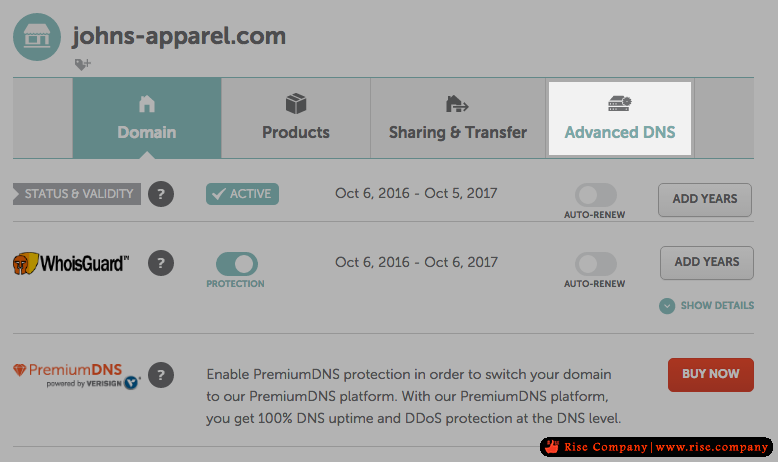ما هو PremiumDNS المدفوع ؟ والفرق بين FreeDns المجانى فى الدومين Domain
Free DNS vs Premium DNS
الـ DNS في حد ذاتها هي ميزة مهمة من خلالها يتم ربط موقعك بدومين (نطاق) وهذه الميزة في الغالب تكون مجانية أو من ضمن قيمة الاستضافة لكن هنالك خدمة DNS متقدمة مدفوعة يفترض أن توفر ميزات اضافية (ولذلك تدفع عليها) هذه الميزات الإضافية لا تحتاجها إلا المواقع الكبيرة المعقدة
الميزات الإضافيةمع التنبيه بعض الشركات تسوق خدمة الـ DNS العادية (المجانية) على أنها خدمة DNS متقدمة وحينها بتدفع فلوس على الفاضي مع أنه لا فرق
وكذلك بعض الشركات الإضافة تعطيك ميزات الـ DNS المتقدمة بشكل مجاني (ضمن فلوس الاستضافة)
تنبيه آخير الشركات التي توفر خدمة DNS متقدمة مدفوعة الثمن تتفاوت في الميزات اللي تقدمها لك فيجب أن تعرف بالضبط ما هي الميزات الموجودة التي تدفع عليها
عبارة عن تقنيات الغرض منها في الأساس زيادة سرعة خدمة الـ DNS العادية و زيادة الحماية
مثلاً
ميزة load balancing فمثلاً لو كان موقع مشهور جدا وعليه اقبال شديد بحيث مثلاً الآلاف الزوار يفتحون موقعك بنفس الوقت هذا قد يسبب ضغط على سرفر الـ DNS فلا يستطيع تلبية جميع الطلبات وحينها لن يظهر موقعك لبعض الزوار وسيحتاجون لتكرار محاولة زيارة موقعك لكن مع ميزة load balancing يتم عمل موازنة وتوزيع لطلبات الزوار على أكثر من سرفر DNS وحينها لا يحصل ضغط على السرفر ويتمكن الجميع من زيارة موقعك
Types of DNS Servers
Most, but not all, domain name registrars offer nameserver services when you register a new domain. Domain owners have the choice of which hosting they prefer. The specifications and limitations vary between the various types.
Self-hosting - DNS can be self-hosted by running DNS software on generic Internet hosting services.
Shared hosting - is when a number of hosting accounts are located on one server, with some sharing the same IP address. These types of plans have limited features and resources, and are not recommended for sites with high resource consumption.
Managed DNS - this is a service that organizations use to outsource DNS to a third-party provider for reasons of simplicity. Another company sets up and maintains their DNS servers.
Virtual Private Server (VPS) - Is where one server acts like a dedicated server. However, a physical server is partitioned into multiple servers, each with their own operating system. VPS users have more control over their nameservers. Each receives a specified share of the resources of the physical server, and are completely isolated from each other, meaning they do not affect each other if they experience problems. Webmasters implement VPS to cut the cost of a dedicated server.
Dedicated DNS - Dedicated hosting providers tend to be the most powerful option, they are faster and more reliable because they are designed for hosting DNS query traffic and nothing else.
Free DNS - covers the basic DNS requirements for most websites.
Premium DNS - includes premium features to keep your site secure with guaranteed uptime, better support and more.
Premium DNS Features
Every commercial website should use premium DNS to guarantee they are both safe and available to their customers. There are distinct advantages of paying for a DNS: improved site availability, faster performance, and minimal security gaps.
Premium DNS involves pointing your domain to premium nameservers and setting up your records on these nameservers.These are the typical features you should expect from premium DNS services:
Paid DNS services offer advanced features to manage your DNS, combined with a higher level of support and faster loading times. If you want super fast IP address resolution, you need a premium nameserver.
The fact of the matter is, extremely quick websites leave a good impression. People are impatient online. If you can shave a few milliseconds off the time it takes for people to discover your site via DNS, you might see some marginal gains.
Fast speeds aren’t only to impress your site visitors; you’ll want to impress Google with your site’s loading and availability. If your site loading times aren’t up to scratch, your search engine rankings and subsequent click rates could take a hit (DNS capabilities make up a huge part of site load times).
+ إنشاء موضوع جديد
النتائج 1 إلى 1 من 1
-
23-11-2018, 16:15 #1Status
- Offline





- تاريخ التسجيل
- Apr 2014
- الدولة
- Egypt
- المشاركات
- 4,625
 Engineering and Technology
Engineering and Technology
- معدل تقييم المستوى
- 10
 ما هو PremiumDNS المدفوع ؟ والفرق بين Dns المجانى فى الدومين Domain
------------------------------------------------------------------------
ما هو PremiumDNS المدفوع ؟ والفرق بين Dns المجانى فى الدومين Domain
------------------------------------------------------------------------
شركة رايز للهندسة و التكنولوجيا Rise Company for Engineering & Technology
------------------------------------------------------------------------
Web Hosting | Web Designing | E-Marketing
رقم # 1 فى خدمات الشركات Business Services
استضافة مواقع Web Hosting - عمل ايميل شركة Business Emails
تصميم موقع شركة Web Design - تسويق الكترونى على جوجل Google Adwords
www.rise.company | www.rise.company/emails
ملحوظة : جميع خدماتنا مخصصة للشركات فقط وغير متاحة للافراد
وليس لنا اى منتجات او صيانة نهائيا! يرجى الانتباه الى ذلك.
المواضيع المتشابهه
-
تنزيل Role الدومين كنترول domain controller ويندوز سيرفر windows server 2016
بواسطة Rise Company في المنتدى قسم الويندوز سيرفر Windows Serverمشاركات: 0آخر مشاركة: 03-08-2018, 20:36 -
توجيه الدومين المنتهى الى صفحة الحظر Redirect Single Domain To A Suspended Page
بواسطة Rise Company في المنتدى رايز للاستضافة Rise Hostمشاركات: 0آخر مشاركة: 10-11-2015, 13:14 -
الفرق بين انواع دومين إضافي وفرعي وموقوف Main Domain و Parked Domain و Addon Domain
بواسطة Eng Amr Adel في المنتدى قسم الدومينات Domainsمشاركات: 0آخر مشاركة: 09-10-2013, 10:29 -
شرح لوحة تحكم الدومين ونقل الدومين من حساب لحساب
بواسطة Eng Amr Adel في المنتدى قسم الدومينات Domainsمشاركات: 0آخر مشاركة: 30-08-2012, 20:31 -
[بأخر اصدار CCleaner 2.27.1070 العملاق المجانى فى التنظيف والتسريع+الشرح الشامل]
بواسطة Eng Amr Adel في المنتدى رايز للكمبيوتر Rise Computerمشاركات: 0آخر مشاركة: 23-12-2009, 15:54




 رد مع اقتباس
رد مع اقتباس
المفضلات